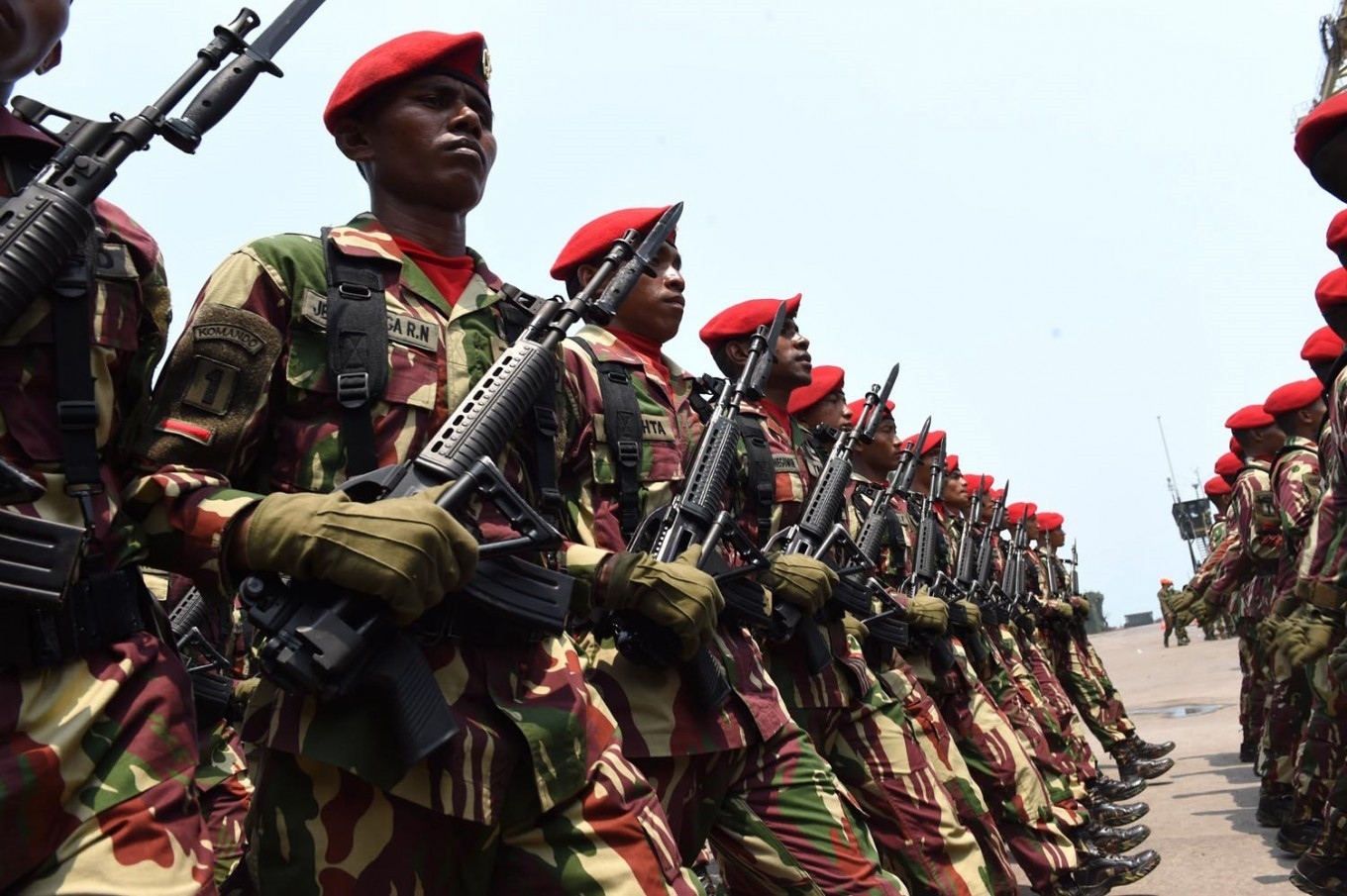News
Prabowo revives plan to amend TNI Law
Tenggara Strategics March 8, 2025 Indonesia's elite military unit Kopasus parade in formation during an exercise at a naval base in Cilegon, West Java province on October 3, 2015 in preparation for the 70th anniversary celebration of the Indonesian Armed Forces on October 5 to be led by I
Indonesia's elite military unit Kopasus parade in formation during an exercise at a naval base in Cilegon, West Java province on October 3, 2015 in preparation for the 70th anniversary celebration of the Indonesian Armed Forces on October 5 to be led by I
The Indonesian Military (TNI) Law has joined the priority list of this year’s National Legislation Program (Prolegnas), after failing to make it in the 2019-2024 term of the House of Representatives. The revision comes as President Prabowo Subianto shows a tendency to involve the military in his flagship programs.
The House leaders have entrusted Commission I overseeing defense to deliberate the draft revision of the TNI Law. During the previous term, the job was given to the House’s Legislation Body (Baleg) in an attempt to accelerate the revision process, but it failed.
Following the inauguration of the House members for the 2024-2029 term last October, Commission I only tabled revision of the Broadcasting Law in its priority list of legislation. The TNI Law revision now looks to take center stage as Prabowo, a former Army general, needs it to justify his intention to increasingly give the military roles in civilian affairs.
The revision of the TNI Law comes on the heels of the rearrangement of the National Resilience Council (Wantannas) into the National Defense Council (DPN) through a presidential regulation (Perpres) that Prabowo signed last December.
The Prabowo administration is also planning to establish 100 Territorial Development Battalions, which will help the government realize its food security agenda. The government has also appointed Maj. Gen. Novi Helmy Prasetya as the new president director of the State Logistics Agency (Bulog), who will carry a mission to support the food self-sufficiency and free nutritious meal programs, confirming the indispensable role of the military in the Prabowo administration.
The plan to revise the TNI Law also stems from debates in the Constitutional Court following a judicial review filed against the existing TNI Law, arguing that the retirement age for TNI personnel is unfair when compared with the retirement age of all other public servants, such as policemen, government employees, teachers, prosecutors and judges, who enjoy longer service periods of up to 60 and 70 years old.
The existing TNI Law says that the retirement age of middle and high-ranking military officers is 58, and for non-commissioned officers and privates, 53.
The judicial review, which was filed by several active military offices, was eventually withdrawn by the plaintiffs, who preferred the government and lawmakers revise the law themselves.
In another judicial review in 2021, the Constitutional Court said the governance between the TNI and the National Police should be at the same level as stipulated in Article 30 of the Constitution. Therefore, the retirement age of personnel of the two institutions should be similar.
The draft revision of the TNI Law also concerns other matters, such as expanding civilian jobs that active military personnel can fill and the relations between the TNI and the Defense Ministry. There has been a long debate among policymakers on how to treat the TNI after the 1998 reforms, especially given the fact that the police force answers to the President, while the TNI falls under the auspices of the defense minister when it comes to budget.
Giving TNI officers more civilian posts is deemed urgent as TNI has to address a career logjam of personnel, which is evident in the fact that hundreds of middle and high-ranking officers do not hold particular posts.
The longer serving period for military personnel could exacerbate the logjam problem, while opening civilian posts for active military members based on the revision plan, it could offer a breakthrough but with the risk of undermining the civil supremacy that the nation fought for during the reforms.
The TNI has played a crucial role in the country’s political dynamics and will continue to do so, due to its access to arms and strict loyalty to the President. Any revision of the TNI Law, however, should not just throw out all the progress we've made and go back to a military government just for the sake of power consolidation. That would be bad for democracy.
What we've heard
A lawmaker has anticipated a tough debate over the article regarding the civilian posts that can be filled by active military officers in the upcoming deliberation of the TNI Law revision. If the provision is approved, active military officers will be allowed to hold civilian posts outside of the civilian jobs in 10 agencies according to the current TNI Law.

